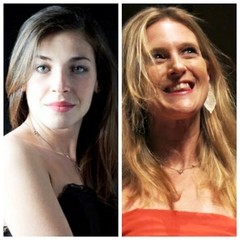|
Back
A Rossi by any Other Name... New York
Zankel Hall, Carnegie Hall
10/06/2017 - & October 4, 2017 (Montreal)
Luigi Rossi: Il palazzo incantato: Sinfonia, “Vaghi rivi”, “Dove mi spingi, Amor?”, “Sol per breve momento” & Ballo – Orfeo: “Al imperio d’amore”, “Mio ben”, “Dormite, begl’occhi” & “Lasciate Averno” – Begl’occhi, che dite – Gelosia ch’a poco a poco – Questo picciolo rio – Se dolente e flebil cetra – La bella più bella – Al soave spirar d’aure serene
Lorenzo Allegri: Il primo libro delle musiche: Canario
Giovanni Felice Sances: L’Orontea: Sonata
Maurizio Cazzati: Trattenimento per camera d’arie, correnti, e balletti: Ciaccona
Céline Scheen (Soprano), Giuseppina Bridelli (Mezzo-Soprano)
L’Arpeggiata, Christina Pluhar (Artistic Director)

G. Bridelli/C. Scheen (© Courtesy of the Artists)
“The principle passions of the soul are anger, serenity and humility. The nature of our voices affirm this with high, low and middle ranges; the art of music manifests it in three terms: agitated, soft and moderate.”
Claudio Monteverdi, Preface to Eighth Book of Madrigals
Who knew? When hearing that Christian Pluhar’s wonderful Baroque musicians, L’Arpeggiata, was returning to Zankel Hall, even without their star singers, my errant eye lit onto the name Rossi, the early Baroque composer for which the concert was devoted.
“Aha!” I thought, “Salomone Rossi, the only great Jewish composer of 16th Century Italy, a man so esteemed in Mantua that he didn’t have to wear the Yellow Star. Finally I can hear him in his too too solid flesh.”
Alas, the Rossi I had anticipated in the program was not the Jewish Rossi. It was a relatively unknown figure named Luigi Rossi, a good Catholic. And while he wrote concurrently with Claudio Monteverdi, the latter was having a high old time breaking the theatrical rules in democratic (sort of) Venice. Luigi was glued to his birth place, the sullen conservative Papal State of Rome.
Not that I had regrets attending last night. Christina Pluhar is always a fascinating leader, innovator and theorbo player. And Luigi Rossi might be a real discovery. That was almost true.
Coincidentally, the previous night, William Christie had conducted the Juilliard415 players in music by the supposed “father of opera.” (Or, if Monteverdi had rivals, the names Peri and Caccini.) Yet last night’s program annotator Harry Haskell proudly put up Luigi Rossi as an opera composer himself. What was going on?

L. Rossi
Well, Luigi did indeed write several operas. And from what I heard last night, neither his Orfeo or an opera based on Orlando furioso were half bad. True, one had to imagine them played in outlandish feathery, furry gonzo costumes, gaudy painted backgrounds, with wheels and levers creakily changing the scenery and bringing on the occasional monster or two. But one certainly didn’t have to imagine music which–within its limitations– was easy to hear, performed with all of L’Arpeggiata’s scholarly élan. Baroque violins, a few violas da gamba, an archlute and Baroque guitar, harpsichord and even some soft drums and a tambourine.
The two singers, Belgian soprano Céline Scheen and Italian mezzo Giuseppina Bridelli have spent their lives in Baroque music, and the roulades, trills and 16th note runs came easily to them. Not that Luigi Rossi gave them the challenges of coloratura divas. That would come some four decades later. These songs and scenas were straightforward.
And if Rossi’s arias lacked that inner emotion of Claudio Monteverdi, the tunes were lovely, elegant and congenial. Though I would have preferred sitting al fresco at moonlight with a bottle of cheap Chianti, along the banks of the Tiber. Then Luigi Rossi would have hit the spot.
The two singers worked together in only a single aria “Dormite, begl’occhi” from Orfeo. And here we could see the difference. In a song celebrating sleep, with repetitions of Dormite, Ms. Bridelli’s mezzo was soothing, soft, solacing. Ms. Scheen was the opposite. Her voice was sharp as a whip, but she couldn’t help a volume which cut through her partner’s words, turning a work of utmost delicacy a more blatant statement.
Not that Ms. Scheen didn’t break through the other songs. Her opening “Vaghi rivi” was stunning, the finale from Orfeo was sung with bravura leading to a quiet stunning ending.
Ms. Bridelli, I felt, had the best of the numbers. With such a voice, she could charm any audience with a folkish piece, “The most charming beauty”, and she had the most remarkable work of all, At the gentle breath of serene beauty.
Far from tranquil, this a story of viciousness and consensual bestiality. The Greek poet Arion, to escape from sailors, jumps into the water, is rescued by a dolphin, and then sings a love song to his rescuer. The changes of drama, the anger, the comfort at the end, and Ms. Bridelli’s soothing fungible voice gave the piece true emotion.
(And a reminder of that old Alan Ladd/Sophia Loren Boy on a Dolphin. Did archeologist Ladd find a statuette from this old story?)
The concert was not totally dedicated to Luigi Rossi The various orchestral works by Rossi’s contemporaries had that rhythmic perfection which has always been a trademark of L’Arpeggiata. Yet the Baroque cornet–sounding like a combination of oboe and trumpet–gave a powerful resonance which bounced off the more tender strings. Yet one had to believe these were the authentic sounds.
A final note to this charming concert. Just as I had misnamed Luigi Rossi, I made another error, seeing the name of composer “Allegri” on the program. The only composer I knew of with this name at that time was the Allegri who wrote Miserere, a complex Papal ode which Mozart miraculously memorized after one hearing.
Thus I need to hear more from Signor Allegri–until realizing that this was Lorenzo Allegri, no relation to the “Mozart” Allegri.
Still his Canario–based on the supposed dances of the Canary Islands–was a jolly work including clapping by the ensemble.
So one could sit back and relax, unlike the extreme attention needed for Wednesday evening’s Monteverdi. The difference in quality between the two composers was in the duet encore which has become L’Arpeggiata’s theme song, Monteverdi’s “Zefiro torna e di soavi accenti”.
I still would love to hear the more famous Rossi and Allegri sometime. But listening to these rarer composers played by such delightful musicians was anything but punishment.
Harry Rolnick
|